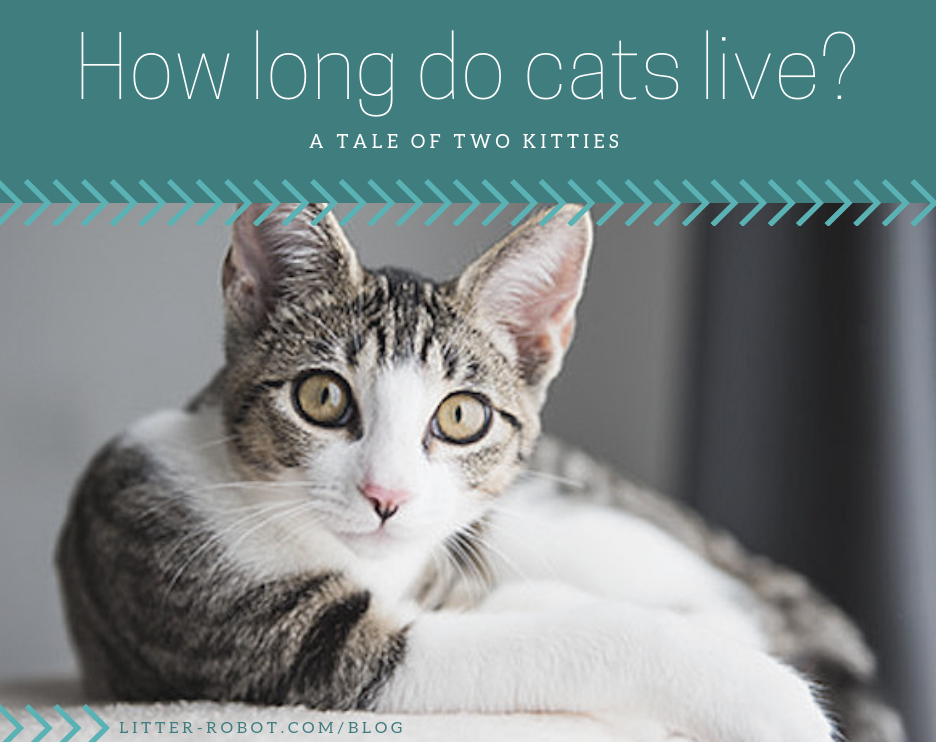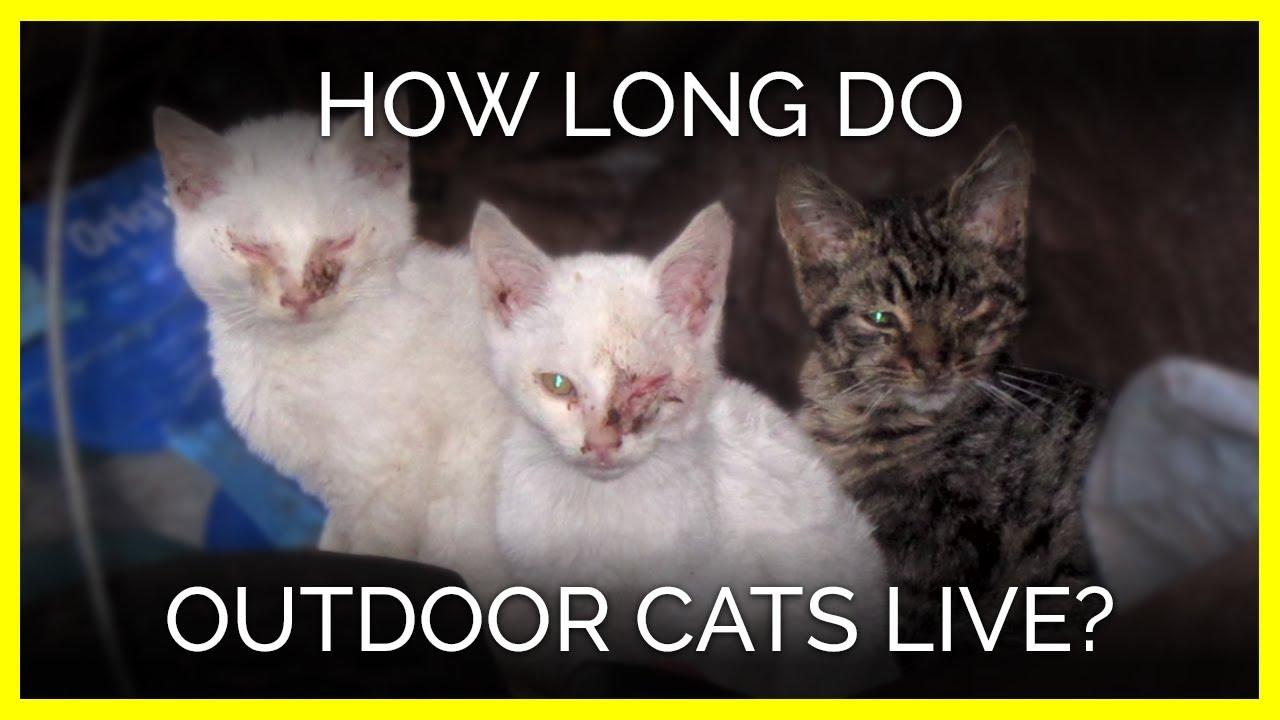Factors that can shorten your cat’s lifespan include health issues, infectious diseases and inherited disorders.
Thankfully, there are ways that you can help your feline friend live a long and healthy life. One of them includes taking them in for regular checkups and providing them with an appropriate diet.
Indoor Cats Live Longer
When you adopt a cat, your ultimate goal is for them to live an extended and healthy life. There are several factors that can contribute to how long your pet lives; their diet, medical care and overall wellbeing all play a role.
Indoor cats tend to live longer than outdoor ones due to fewer risks such as car accidents or predators such as raccoons. Therefore, indoor cats have an advantage in terms of lifespan.
On average, indoor cats live between 13-17 years. However, this number can vary significantly depending on the breed and lifestyle; one reported cat named Creme Puff lived to be 38 years old!

This is great news for cat lovers everywhere. It means more cats can live longer and happier lives with their humans.
If you do decide to let your cat outside, make sure they do so safely. In areas with predators or many cars on the road, take extra steps to guarantee that your feline friend has a secure place to rest.
Additionally, providing your cat with a nutritious diet and access to fresh water at all times is beneficial. A balanced diet will keep them healthy and strong, potentially increasing their lifespan.

One key factor that helps ensure your cat lives a long life is regular vet visits. Taking them to the vet about once annually can prevent serious issues that could reduce their lifespan or cause them to pass away prematurely.
When your pet displays any unusual behavior or eating habits, visiting the vet is highly recommended. These could be symptoms of an illness, disease or other medical issue that requires immediate treatment.
Spaying or neutering your cat is a wise decision, as it will help them live a longer and healthier life. Without proper medical attention, they could develop diseases like feline leukemia or other illnesses that could cause death prematurely.
Purebred Cats Live Longer
Diet, exercise and medical care all play a role in determining a cat’s lifespan; however, genetic makeup is the biggest factor affecting their life expectancy. Selecting either a purebred or mixed breed cat can increase your pet’s longevity significantly.

Siamese and Burmese cats, in particular, are known for their long lives. On average, these long-haired felines live an average lifespan of 15 years but some can reach 20.
They’re known for their kind hearts and sweet personalities. These loyal companions enjoy spending time with their owners.
These cats do have some health issues that need to be addressed. They’re susceptible to dental and respiratory conditions, as well as being predisposed to cranial deformities and glaucoma.
One reason some purebred cats live longer than others is their genetic makeup. These breeds have been bred to have a lower bodyweight and be less susceptible to common cat diseases.
Some of these traits include being less likely to suffer from heart disease or high blood pressure. Unfortunately, these health issues can cause a cat’s life to be cut short, so it is essential that you take measures to keep your pet healthy and living as long as possible.
Other factors that affect a cat’s lifespan include their lifestyle and environment. A home with clean, well-maintained indoor space is one of the essential ingredients for keeping your furry friend healthy and contented.
Maintaining a cat’s home with enough food, water and litter will not only help them live longer but also decrease their vulnerability to infections and parasites that could pose serious illnesses in later years.
Some factors that can extend a cat’s life expectancy include its gender and overall health. Female cats tend to live longer than males since they’re less likely to engage in roaming or fighting activities.
Mixed Breed Cats Live Longer
Are you searching for a furry companion to add to your home? Mixed breed cats could be just what you need. These furry creatures make great additions to any family due to their individuality, love of life and personalities. Not only that but they’re often more loyal and friendly than other cats when it comes to their humans than other felines are.
Mixed-breed cats are so affectionate and loyal, some people even compare them to dogs! Plus, they’re much more common than one might think: according to the American Pet Products Association, mixed-breed cats are actually more prevalent in America than purebred ones!
Many factors contribute to a cat’s life span, including genetics and diet. But one of the best ways to ensure its wellbeing is feeding it a high-quality food with plenty of protein and essential vitamins.
Another key factor in how long a cat lives is their environment. Indoor cats tend to live longer than outdoor ones.
Siamese cats in particular often live 15 years or longer, while Burmese can reach 20 years of age. Furthermore, these breeds of cat are very social – making them perfect for families with kids who enjoy playing with them.
Other breeds that tend to live longer include Sphynx cats, Persian cats and Balinese cats. These long-haired felines possess the added benefit of being highly social and intelligent.
If you’re searching for a cat with an extended lifespan, consider adopting one of these gorgeous and healthy breeds.
Ragdolls are affectionate, cuddly cats with long, silky fur that enjoy cuddling up with their human companions. They’re known to be quite laidback; in fact, some even go limp in relaxation when held.
Though they may appear friendly, they do have some health issues to monitor. Due to their propensity for bladder stones and eye disease, regular vet visits are necessary for your pup’s wellbeing.
They may also be susceptible to heart disease and obesity, so it’s essential that they follow a nutritious diet and get plenty of exercise.
These cats make excellent family pets due to their elegance and sophistication. Furthermore, they possess great intelligence; this allows them to learn tricks and walk on a harness with ease.
Outdoor Cats Live Shorter
Indoor cats tend to live up to 15 years on average, while outdoor cats only live two to five years due to the danger they face when outside, such as being hit by cars or being attacked by predators.
It is also essential to remember that cats who live outdoors may develop health issues. Therefore, it’s essential to monitor them closely for signs of discomfort. If you notice any changes in your cat’s behaviour or general wellbeing, contact your veterinarian right away.
Maintaining an outdoor cat’s wellbeing requires providing them with a nutritious diet and plenty of fresh water. This will keep their internal organs hydrated, which in turn keeps them content.
Outdoor cats are vulnerable to predators and wild animals waiting to pounce, so it’s essential that you keep them away. Furthermore, many diseases can affect outdoor cats, so getting them checked out by a veterinarian regularly is recommended.
One of the primary reasons why outdoor cats tend to live short lives is that they do not receive regular medical care. Without vaccinations against illnesses like fleas and ticks, which can be very hazardous to their health, outdoor cats often lead a life of neglect.
Furthermore, they may come into contact with various viruses and bacteria which could be detrimental to their health. Furthermore, accidents or fights could potentially result in an early demise.
Another reason why outdoor cats tend to live shorter lives is that they lack shelter from the elements, leaving them vulnerable to harsh weather conditions and predators such as raccoons and foxes. Without adequate shelter, outdoor cats become prey to dangerous weather conditions that could otherwise prove fatal.
Outdoor cats are particularly vulnerable to illnesses and parasites that could negatively impact their health and lead to early death. Some of these issues include ticks, fleas, lice, and mites – all of which pose serious threats for a cat’s wellbeing.
